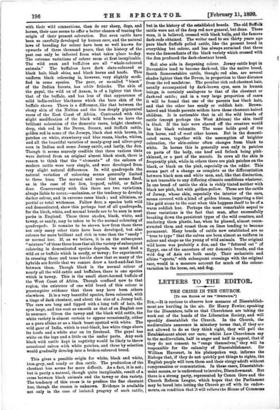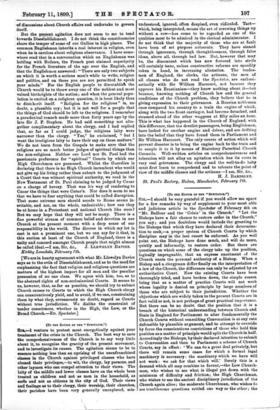LETTERS TO THE EDITOR.
THE CRISIS IN THE CHURCH.
[To THE EDITOR Or THZ " SPECTATOR:9 Sift,-It is curious to observe bow menaces of Disestablish- ment are hurtling in the air. Sir Henry Fowler, speaking for the Dissenters, tells us that Churchmen are taking the work out of the hands of the Liberation Society, and will speedily disestablish the Church. In the Church, the mediaevalists announce in minatory terms that, if they are not allowed to do as they think right, they will pull the Establishment about our ears; whilst Low Churchmen say to the mediaevalists, half in anger and half in appeal, that if they do not consent to "range themselves," they will be responsible for the calamity of Disestablishment. Sir William Harcourt, in his plainspoken way, informs the Bishops that, if they do not quickly put things to rights, the English people will turn them and their clergy adrift without compensation or commutation. In these cases, Disestablish- ment means, or is understood to involve, Disendowment. But there is a strong party, represented by Canon Gore and the Church Reform League, which hopes that the Parliament may be bored into letting the Church go off with its endow- ments, on condition that it will relieve the House of Commons of discussions about Church affairs and undertake to govern itself.
Bat the prrent agitation does not seem to me to tend towards Disestablishment. I do not think, the constituencies
share the temper of some of our Gallios in high places. The common Englishman inherits a real interest in religion, even when he is careless about religions observance. I have some- where read that in a conversation which an Englishman was holding with Boileau, the French poet claimed superiority for the French literature of the age over the English, and
that the Englishman answered: "There are only two subjects on which it is worth a serious man's while to write, religion and politics, and on these you are not permitted to speak your minds." For the English people to disestablish the Church would be to throw away one of the noblest and most valued birthrights of the nation; and when the general popu- lation is excited on a religious question, it is least likely thus to disinherit itself. " Religion for the religions " is, no doubt, a plausible cry ; but it is not well for a people that the things of God should be left to the religions. I remember a paradoxical remark made more than forty years ago by the late Sir J. F. Stephen. He had said something not alto- gether complimentary about the clergy, and I had replied that, so far as I could judge, the religious laity were narrower than the clergy. "Yes," he exclaimed, " but I want the irreligious laity to have their say on these matters." We do not learn from the Gospels to make sure that the religious are so much better judges of spiritual things than the non-religious. Neither our Lord nor St. Paul had the passionate preference for " spiritual" Courts by which our High Churchmen are possessed. Whilst the Guardian is declaring that there is no High Church incumbent who would not give up his living rather than submit to the judgment of a Court that was without spiritual authority, we read in the New Testament of St. Paul claiming to be judged by Caesar on a charge of heresy. That was his way of rendering to Cmaar the things that were Cmsar's. Nor does it seem to me that we have to fear anything that could be called disruption. That some extreme men should secede to Rome seems in- evitable, and not, on the whole, undesirable ; how can they be at home in a Protestant and national Church like ours P But we may hope that they will not be many. There is a fine powerful stream of common belief and devotion in our Church at the present moment with a deep sense of our responsibility in the world. The diocese in which my lot is cast is not a prominent one, but we can say for it that, in this section at least of the Church of England, there is a unity and concord amongst Church people that might almost [We are in hearty agreement with what Mr. Llewelyn Davies says as to the evils of Disestablishment, and as to the need for emphasising the fact that religion and religious questions are matters of the highest import for all men and the peculiar possession of no one class. We agree with him, too, as to the abstract rights of non-ecclesiastical Courts. It seems to us, however, that, asiar as possible, we should try to submit Church causes to Courts to which the High Church clergy can conscientiously yield, and to avoid, if we can, constraining them by what they, erroneously no doubt, regard as Courts without true jurisdiction. We dislike the constraint of tender consciences, whether in the High, the Low, or the Broad Church.—En. Spectator.]







































 Previous page
Previous page